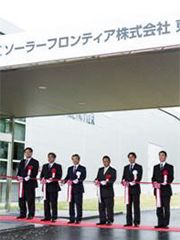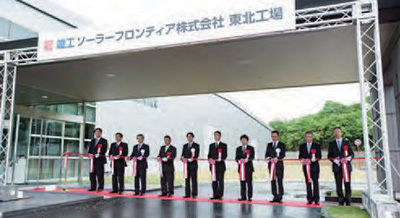Research Results
A scenario for promoting recovery and reconstruction from the Great East Japan Earthquake, based on low carbonization.
Contributing to advancement of thin-film solar cell manufacturer into Miyagi Prefecture FY2016

- Center for Low Carbon Society Strategy (LCS)
Social Scenario Development for the Establishment of Low Carbon Society
Towards bright and comfortable low carbon society
LCS is proposing social scenarios to contribute to the realization of a sustainable, "affluent low carbon society" that is conducive to the economic and social development of the new Japan.
Specifically, LCS has set the several objectives of realizing a low carbon society. To achieve these objectives, we propose quantitative scenarios and strategies showing images of society expected in 2020- 2030, which leads to society in 2030-2050, while responding to social changes.
Proposing scenarios using the renewable energy for promoting recovery and reconstruction from the earthquake
Following the Great East Japan Earthquake on March 11, 2011, LCS has established"Study Team for the special Measure-Scenarios for recovery and reconstruction from the Great East Japan Earthquake", and has worked on the formulation of a feasible scenario for recovery and reconstruction of regions devastated by the earthquake.
LCS 's scenario is promoting the recovery and reconstruction from the earthquake based on low carbonization. It enables regional characteristics to be applied and is based on the plans for the recovery plan that the Tohoku region hopes to employ.
In addition, this scenario includes various factors such as introduction of technologies and systems in order to take full advantage of the renewable energy, the construction of systems for the realization of advanced agriculture and forestry with high productivity and profitability, and the revitalization of the local communities corresponding to the aging society.
LCS proposed a low carbonization scenario for promoting recovery and reconstruction from the earthquake to Miyagi Prefecture, which was devastated by the earthquake. It focuses on a technology scenario for the development of solar cells, and also the Prefecture investigated it as the "utilization of renewable energy"in the recovery plan.
In particular, to Miyagi Prefecture, LCS proposed inviting Solar Frontier K.K., a solar cell manufacturer which has excellent abilities and technologies for developing and manufacturing CIS thin film solar cells, and their setting up a new plant in the Prefecture.
According to our research, CIS thin film solar cell technologies are evaluated to be far superior to the others in terms of both a low plant construction cost and the possibility of reducing costs by future technology development.
Additionally, LCS explained to Solar Frontier about the superiority of their modules and power-generating systems, using the cost scenario based on the calculation performed by LCS. And also LCS indicated the prospects of their receiving various merits from Miyagi Prefecture including the acquisition of a plant site, environmental arrangement and so on.
Towards the realization of a low carbon society in Miyagi Prefecture by integrated efforts of the Prefecture, the company and the nation
Solar Frontier constructed a plant in Ohira village, Miyagi Prefecture and it has started operation of it on April, 2015.
Solar Frontier showed appreciation for LCS 's technological scenarios and its efforts to explore the possibility of future use of CIS thin film solar cells, and effective roles to proceed with their plant construction in Miyagi Prefecture.
This is the case of advancement of thin-film solar cell manufacturer into the Prefecture towards the realization of a low carbon society by integrated efforts of the Prefecture, the company and the nation. Especially the company has strong willingness to contribute to recovery and reconstruction of the Prefecture and Tohoku region, and to face the challenge of producing cost-competitive solar cells through the introduction of new technologies.

Koichi Yamada, Deputy Director-General of Center for Low Carbon Society Strategy (second from the right), attending the ceremony to celebrate the completion of Solar Frontier "Tohoku Plant"
